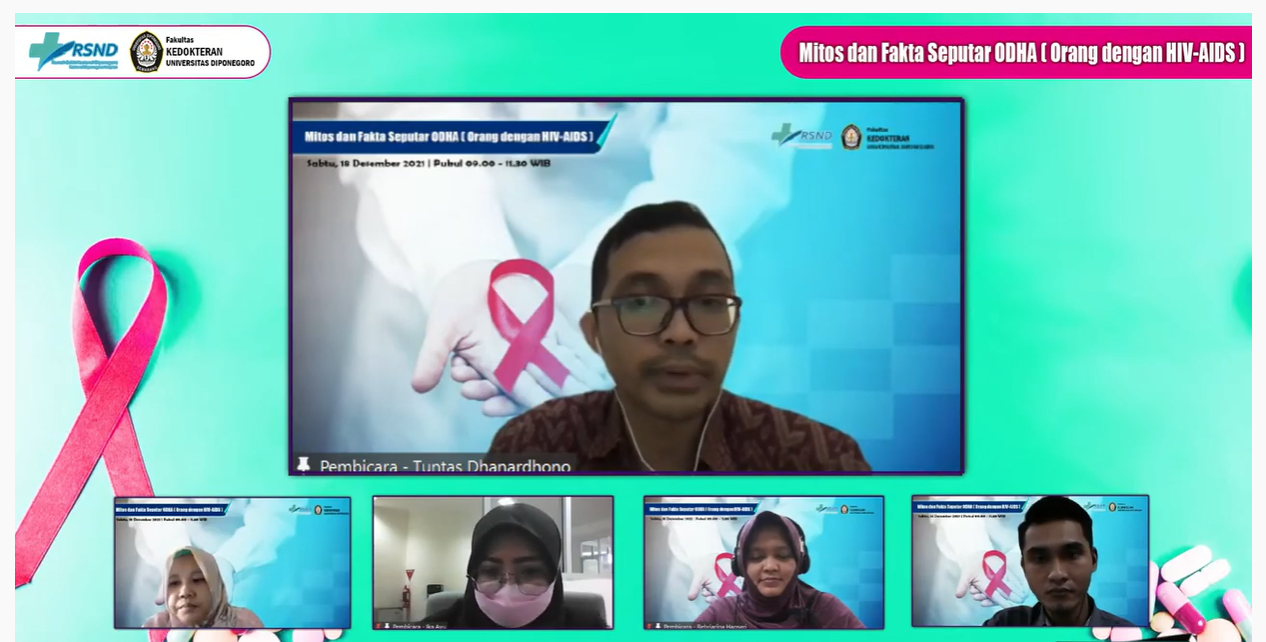In commemoration of World AIDS Day 2021, the Diponegoro National Hospital (RSND) of Diponegoro University (Undip) in collaboration with the Faculty of Medicine (FK) Undip and IDI Semarang City provided information to the public regarding the prevention of infection and transmission of HIV-AIDS through Webinar entitled “Myths and Facts Regarding PLWHA ( People with HIV-AIDS)” (18/12).
dr. Tuntas Dhanardhono, M.Si.Med., SpKF, M.H., in his material on “Anti-discrimination of PLWHA: Biometic Review and Community Responsibility”, said that HIV is a virus that causes AIDS. Meanwhile AIDS is a collection of various symptoms of disease due to the decrease in individual immunity because the body is infected with HIV. The problems experienced by PLWHA include psychological problems, depression, anxiety, cognitive disorders, to personality disorders such as feeling useless, afraid, sad, and hopeless. Social problems, discrimination, stigmatization, divorce, dismissal from work, the financial burden that must be borne by PLWHA, and being shunned by close relatives. In addition to biological problems, PLWHA also suffered because of opportunistic infections of symptoms associated with AIDS, side effects of ARV drugs, and immune recovery syndrome.
“Discrimination occurs because of prejudice, misunderstanding, ignorance, fear, bad labels. In general, the responsibility of society is that everyone is obliged to respect human rights, morals, ethics, and the order of life in society, nation and state. We can participate in the protection, enforcement and promotion of human rights, submit reports on the occurrence of human rights violations, submit proposals on the formulation and policies related to human rights, and conduct research and dissemination of information on human rights. Moral support is also important for the sufferers to keep a high spirit to live their lives and carry out activities as usual. Social support is useful to restore self-confidence,” he continued.
dr. Rebriarina Hapsari, M.Sc., Sp.MK(K) said that the HIV virus is transmitted through body fluids, blood, semen (including pre-ejaculate fluid), vaginal fluids, rectal fluids, and breast milk.
“Body fluids containing the HIV virus enter the body through unsafe sexual activities, from mother to fetus or baby during pregnancy, childbirth or breastfeeding, use of unsterilized syringes, and donor blood or organs infected with HIV,” she said.
In her presentation, Ika Hayu Haryatmi, S.KM., M.Kes said that when diagnosed with HIV, the sufferers will experience feelings of sadness, a feeling that drags everyone to live it in solitude. The emotional changes in someone who feels sad will eat them up inside and affect the people around them. Grief will cause emotional feelings, distrust, anxiety, hopelessness, and feeling of suffering which is sometimes followed by crying, not infrequently even the desire to commit suicide appears.
dr. Julian Dewantiningrum, M.Si.Med, SpOG(K) conveyed the importance of disclosure of HIV status to partners and health workers when planning pregnancy. If the person is diagnosed with HIV/AIDS, the assistance of counselor or peer support to provide information of HIV status to the partners of the sufferer is needed. In addition to involving and inviting partners in planning pregnancy, pregnancy planning is a decision and commitment with the partner. The consequence of not being honest and open with each other is that there is a potential for HIV transmission to partners as well as not getting support from partners during pregnancy and after delivery, both for mother and baby. (Lin – Public Relations)

